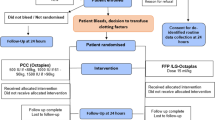Abstract
Objective
To analyze the procedure of the informed consent for ICU research obtained before ICU admission.
Design
Prospective, open, observational study.
Setting
20-bed surgical ICU of a tertiary teaching university hospital and the ward before and after ICU.
Patients
Patients, scheduled for elective cardiac surgery, who accepted to participate in a coagulation study.
Interventions
Patients underwent the same informed consent procedure, including an oral presentation of the coagulation study and an informative leaflet the day before surgery on the ward.
Measurements and results
Between January and August 2001, we included 38 patients; 36 survived ICU. Ten to 12 days after surgery, 8/36 (22%) patients did not know they had participated in a study, and 9/36 (25%) could not recall the study purpose and the related risk. Patients with incomplete recall stayed longer in ICU [median (range): 4 (3–6) vs 3 (1–5) days; p = 0.004]. None of these patients (0/9 vs 10/27; p < 0.04) had read the informative leaflet AND asked at least one question during the informed consent procedure.
Conclusions
Even when the informed consent is obtained in the most optimal conditions for ICU research, its ethical value remains questionable. Indeed, a substantial number of patients were unaware of their study participation, or of the related purpose and risks. When the ICU stay is prolonged, we should at least repeatedly and actively (re)-inform patients about their study participation.

Similar content being viewed by others

References
(1996) Declaration of Helsinki (1964) BMJ 313:1448a–1449
(2001) Directive 2001/20/EC of the European Parliament and of the Council of 4 April 2001 on the approximation of the laws, regulations and administrative provisions of the Member States relating to the implementation of good clinical practice in the conduct of clinical trials on medicinal products for human use. In: Official Journal L 121,01/05/2001 P.0034–0044
Etchells E, Sharpe G, Burgess MM, Singer PA (1996) Bioethics for clinicians: 2. Disclosure. CMAJ 155:387–391
Etchells E, Darzins P, Silberfeld M, Singer PA, McKenny J, Naglie G, Katz M, Guyatt GH, Molloy DW, Strang D (1999) Assessment of patient capacity to consent to treatment. J Gen Intern Med 14:27–34
Silverman HJ (1996) Ethical considerations of ensuring an informed and autonomous consent in research involving critically ill patients. Am J Respir Crit Care Med 154:582–586
Lemaire F, Bion J, Blanco J, Damas P, Druml C, Falke K, Kesecioglu J, Larsson A, Mancebo J, Matamis D, Pesenti A, Pimentel J, Ranieri M (2005) The European Union Directive on Clinical Research: present status of implementation in EU Member States' legislations with regard to the incompetent patient. Intensive Care Med 31:476–479
Silverman HJ, Druml C, Lemaire F, Nelson R (2004) The European Union Directive and the protection of incapacitated subjects in research: an ethical analysis. Intensive Care Med 30:1723–1729
Lemaire F (2004) A waiver of consent for intensive care research? Intensive Care Med 30:177–179
Smithline HA, Mader TJ, Crenshaw BJ (1999) Do patients with acute medical conditions have the capacity to give informed consent for emergency medicine research? Acad Emerg Med 6:776–780
Cassell EJ, Leon AC, Kaufman SG (2001) Preliminary evidence of impaired thinking in sick patients. Ann Intern Med 134:1120–1123
Cohen LM, McCue JD, Green GM (1993) Do clinical and formal assessments of the capacity of patients in the intensive care unit to make decisions agree? Arch Intern Med 153:2481–2485
Ferrand E, Bachoud-Levi AC, Rodrigues M, Maggiore S, Brun-Buisson C, Lemaire F (2001) Decision-making capacity and surrogate designation in French ICU patients. Intensive Care Med 27:1360–1364
Le Gall JR, Lemeshow S, Saulnier F (1993) A new Simplified Acute Physiology Score (SAPS II) based on a European/North American multicenter study. JAMA 270:2957–2963
Akkad A, Jackson C, Kenyon S, Dixon-Woods M, Taub N, Habiba M (2004) Informed consent for elective and emergency surgery: questionnaire study. BJOG 111:1133–1138
Williams BF, French JK, White HD (2003) Informed consent during the clinical emergency of acute myocardial infarction (HERO-2 consent substudy): a prospective observational study. Lancet 361:918–922
Gammelgaard A, Mortensen OS, Rossel P (2004) Patients' perceptions of informed consent in acute myocardial infarction research: a questionnaire-based survey of the consent process in the DANAMI-2 trial. Heart 90:1124–1128
Yuval R, Halon DA, Merdler A, Khader N, Karkabi B, Uziel K, Lewis BS (2000) Patient comprehension and reaction to participating in a double-blind randomized clinical trial (ISIS-4) in acute myocardial infarction. Arch Intern Med 160:1142–1146
Taub HA, Baker MT, Sturr JF (1986) Informed consent for research. Effects of readability, patient age, and education. J Am Geriatr Soc 34:601–606
Hekkenberg RJ, Irish JC, Rotstein LE, Brown DH, Gullane PJ (1997) Informed consent in head and neck surgery: How much do patients actually remember? J Otolaryngol 26:155–159
Flory J, Emanuel E (2004) Interventions to improve research participants' understanding in informed consent for research: a systematic review. JAMA 292:1593–1601
Dreyfuss D (2005) Is it better to consent to an RCT or to care? (“nothing in excess”). Intensive Care Med 31:345–355
Truog RD (2005) Will ethical requirements bring critical care research to a halt? Intensive Care Med 31:338–344
Emanuel EJ, Wendler D, Killen J, Grady C (2004) What makes clinical research in developing countries ethical? The benchmarks of ethical research. J Infect Dis 189:930–937
Acknowledgements
Support was provided solely from institutional and/or departmental sources.
Author information
Authors and Affiliations
Corresponding author
Additional information
Presented in part at the annual congress of the American Thoracic Society (ATS), May 2003, in Seattle, WA, USA
Rights and permissions
About this article
Cite this article
Chenaud, C., Merlani, P. & Ricou, B. Informed consent for research in ICU obtained before ICU admission. Intensive Care Med 32, 439–444 (2006). https://doi.org/10.1007/s00134-005-0059-4
Received:
Accepted:
Published:
Issue Date:
DOI: https://doi.org/10.1007/s00134-005-0059-4



